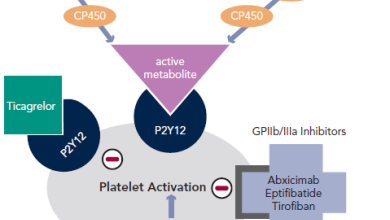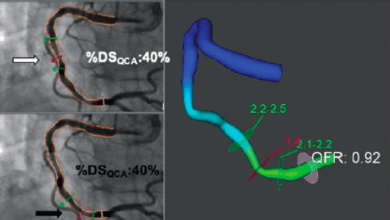Search results
Author(s):
Petr Kala
Added:
3 years ago
Patients suffering acute myocardial infarction with ST-segment elevation (STEMI) require full attention of the whole STEMI network to save their lives and to improve the quality of life after a heart attack. Close cooperation among all stakeholders on a national and regional level has to be established. The emergency medical service (EMS) and direct transportation to the 24 hours a day, seven…
View more
Author(s):
Matthias Hasun
,
Franz Weidinger
Added:
3 years ago
For ST-segment elevation myocardial infarction (STEMI), there is currently no doubt that primary percutaneous coronary intervention (PPCI) of the infarct related artery (IRA) is the preferred reperfusion strategy.1 In about 50% of cases, STEMI is associated with multivessel coronary artery disease (MVCAD), defined as a ≥50% stenosis in at least one non-infarct related epicardial coronary artery …
View more
Author(s):
Deepak Natarajan
Added:
3 years ago
Primary percutaneous coronary intervention (PCI) is the treatment of choice in the management of acute ST-segment elevation myocardial infarction (STEMI). It has been constantly observed that, despite restoring good epicardial flow with PCI, myocardial perfusion at the cellular level remains impaired in nearly 50 % of STEMI patients. This led to the development of a new class of antiplatelet…
View more
Author(s):
Fizzah A Choudry
,
Roshan P Weerackody
,
Daniel A Jones
,
et al
Added:
3 years ago
Over the last few decades, primary percutaneous coronary intervention (PCI) has revolutionised the treatment of ST-elevation myocardial infarction (STEMI) with rapid recanalisation of the infarct-related epicardial vessel, resulting in smaller infarct size and a substantial reduction in adverse clinical endpoints.1,2 However, suboptimal myocardial reperfusion is documented to occur in a…
View more
Author(s):
Joel P Giblett
,
Heerajnarain Bulluck
Added:
3 years ago
The translation to clinical practice of agents or techniques that protect against the effect of ischaemia–reperfusion (IR) injury remains one of the most challenging areas of research in the field of cardiovascular medicine.1–4 This is particularly the case when IR injury follows revascularisation for acute MI (AMI). The publication of the combined Effect of Remote Ischaemic Conditioning on…
View more
Author(s):
Roberto Scarsini
,
Dimitrios Terentes-Printzios
,
Giovanni Luigi De Maria
,
et al
Added:
3 years ago
Acute coronary syndromes (ACS) encompass a wide spectrum of clinical presentations that range from ST-elevation MI (STEMI) to non-ST-elevation MI and unstable angina. These conditions are life threatening and remain a source of high morbidity and mortality. Unfortunately, despite major accomplishments worldwide in timely reperfusion with percutaneous coronary intervention (PCI), an important…
View more
Author(s):
David S Wald
,
Jonathan P Bestwick
Added:
3 years ago
The management of patients with acute ST-elevation myocardial infarction (STEMI) relies on restoring blood flow to the occluded infarct artery. Prompt percutaneous coronary intervention (PCI) and stenting of the stenosis causing the occlusion reduces the risk of cardiac death and recurrent infarction.1 In about half of patients,2 stenoses are identified in non-infarct arteries at the time of the…
View more
Author(s):
Sri Raveen Kandan
,
Thomas W Johnson
Added:
3 years ago
Antiplatelet Therapy
Current guidelines support the early administration of oral antiplatelet agents upstream of angiographic assessment and intervention.1 Aspirin is commonly given by the first medical contact and additional oral antiplatelet drugs are administered on arrival in hospital (see Figure 1).
Aspirin
The efficacy of aspirin in acute ST-segment elevation myocardial infarction (STEMI)…
View more
James M McCabe
Research Area(s) / Expertise:
Author
Expertise
Author(s):
Luigi Di Serafino
,
Fabio Magliulo
,
Giovanni Esposito
Added:
2 years ago














